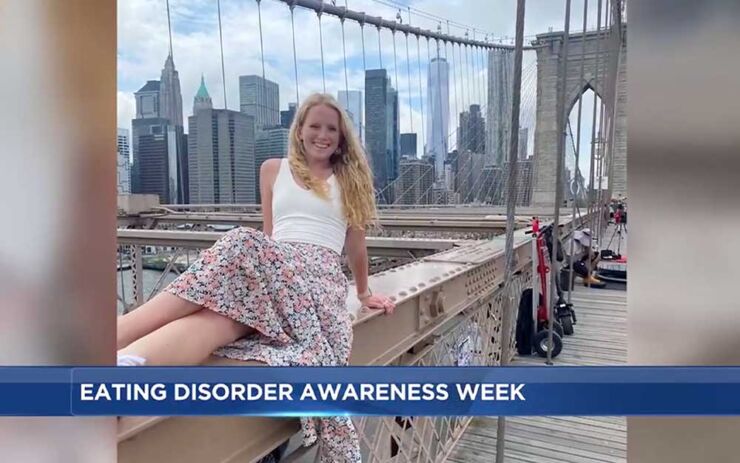From TV interviews to spirit weeks, Rogers took part in Eating Disorders Awareness Week, spreading critical information and inspiring hope.
From Monday, February 26 to Sunday, March 3, the annual campaign put on by National Eating Disorders Association (NEDA) focuses on public awareness and its critical role in better recognizing and treating eating disorders.
NEDA set this year’s theme as “Get in the Know.” In support of that mission, several Rogers experts did interviews with TV news stations, talking about the signs and symptoms of eating disorders and the resources available. They highlighted that while eating disorders can be highly-impairing and life-threatening, recovery is possible.
‘Ask for help’: Former patient shares story
Spreading a message of awareness and hope, Dr. Nicole Stettler, PhD, executive clinical director of eating disorders services, and Jordan Kernen, a woman treated at Rogers who wanted to share her journey, were featured in two Madison stories: one on News 3 Now and one on WMTV News.
“It was my first year of college, and my sister and I were like, ‘Oh, we’re just going to go on a health kick. It can start so innocently, but there are people who have personalities and bodies and minds that take that to the extreme. That was what happened with me,” Jordan said in the News 3 Now story. "Going to Rogers changed my life, being able to reshape who I am today. I would not be a teacher, I would not be living on my own. I wouldn’t be sitting here today.”
Dr. Stettler spoke about warning signs, such as big changes in behavior, and how to help yourself or loved ones.
"Eating disorders thrive in secrecy and really cause a lot of anxiety, especially in an eating situation. A lot of times, we might see people avoiding going out to eat with friends or going out to eat with family or joining family celebrations,” she said in her interview. “How I might think about approaching somebody who I’m concerned about would probably to be really rooted in specific behaviors that I’m noticing, kind of objective things that I’m observing. So for example, ‘I’m noticing that you’ve stopped coming to family dinners that you used to attend.’”
Dr. Stettler also drew attention to the fact that not all eating disorders look the same, contributing to under-detection, and that eating disorder rates are rising in boys and men as well.
“As hard as it can be, ask for help,” Jordan said. “Because it’s OK to not be OK, and there are tons of people out there that are experts at this and can really help you get your life back. “Rogers saved my life and made me realize that there is more to me than just my eating disorder.”
Jordan is now a teacher in the same district where she went to school, saying her journey has helped her better empathize with her students’ mental health challenges.
See more about Jordan’s journey at Rogers here.
More Rogers experts in the news
At the start of the week, Dr. Brad Smith, MD, DFAPA, chief medical officer, joined WISN-TV in Milwaukee for a live interview about the signs of eating disorders and resources available.
Live on CBS Chicago, Dr. Peter DeVries, MD, medical director, adult inpatient Eating Disorder Recovery in Oconomowoc, shared critical information about eating disorders including avoidant/restrictive food intake disorder (ARFID) and how diet culture can play into eating disorders.
To finish the week, Dr. Stettler did a live interview on WISN-TV in Milwaukee Friday, focusing specifically on ARFID, its symptoms, and the treatment available.
Spirit weeks and alumni speaker
In Eating Disorder Recovery residential care in Oconomowoc, both adult and adolescent programs held spirit weeks for residents and staff, with themed days including “Crazy Hair Day,” “Favorite Decade Day” and “Wear Purple Day,” a color used with a butterfly as a symbol for eating disorder recovery. There were also opportunities to decorate recovery or coping skill tote bags in art therapy the whole week.
An alumna of the program, Denise Folcik, also came back to speak with adult residents about her recovery.


